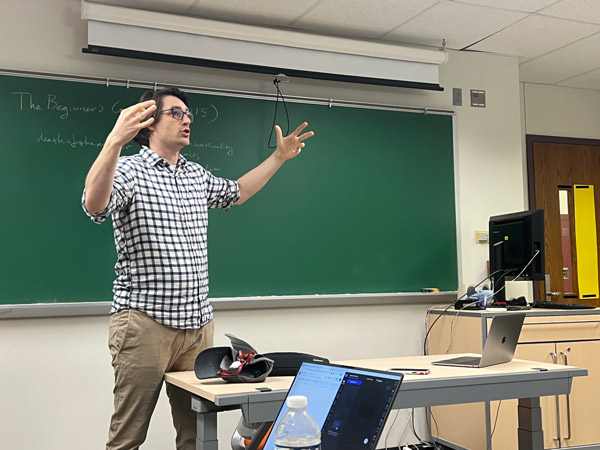Spotlight: Phillip Lobo
Dr. Phillip Lobo (English and current Department Chair) joined the Academy faculty in the fall of 2019. As an undergraduate at Tufts University he majored in English then went on to receive his Ph.D. in Comparative Literature from the University of Southern California. Dr. Lobo has been published in journals such as Postmodern Culture, Game Studies, and Chiasma, on subjects ranging from ecocriticism to Japanese film.
A Note from Dr. Lobo
When I first arrived at the Academy, fresh out of graduate school, I mostly played it safe: I taught what I knew, or knew well enough to make sure I had something clever to say, some point to bring the discussion to, some bow to tie at the end of each class. There were benefits to this – I’m a comparatist by training, and had luck in pairing texts with productive resonances. I could make Whitman’s Crossing Brooklyn Ferry and Poe’s The Man of the Crowd converse about the experience of busy city streets. I could dip into science-as-literary metaphor in Pynchon’s Entropy and Le Guin’s Schrödinger’s Cat. I could set the tempo, and choose the tune.
This went on for three years, and the texts I taught became well-worn if also well-loved. Then, by chance, I encountered a bit of educational philosophy called The Ignorant Schoolmaster. It told the story of a late 18th century educationist who discovered he could teach entire subjects he knew nothing about, trusting not in his expertise but in the individual intelligence of the students and their ability to learn without being led. Instead of pretending that the beginning and ending of understanding lies in the mind of the instructor, students could have confidence in their own interpretations. This seemed especially suited for literature, where meaning is emergent and contingent, coming to life with new significance under the eye of each new reader.

I wasn’t so bold as to start trying to teach chemistry or computer science, but I decided instead of teaching only what I already felt confident I understood, I should throw the doors open to the entirety of our anthologies, the fullness of our potential reading list. Henceforth, in most of my literature classes the students select the majority of the readings, ranging freely and picking out whatever strikes their interest. No two reading lists are ever the same, and no two classes resolve with the same themes, the same ideas, the same accepted interpretations.
The benefits of this method have been remarkable. It has led to discoveries of texts I would not have dared assign on my own, yet are now favorites I can’t wait to revisit. It has kept my brain alive and my spirit bright as I am saved from the temptations of set syllabus and yellowed lecture notes. Most importantly, it allows me to meet my students on the common ground of the unfamiliar, on terms of comparative equality. I have my education as an advantage, my long years of experience picking through texts, but I can never claim to hold any pre-planned answer. Whatever meaning we arrive at, we arrive at it together.

